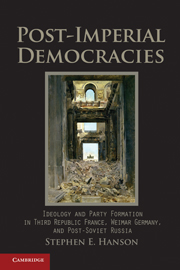 Post-Imperial Democracies
Post-Imperial Democracies Book contents
- Frontmatter
- Contents
- Acknowledgments
- Preface
- Post-Imperial Democracies
- PART ONE CONCEPTUAL AND THEORETICAL ISSUES
- PART TWO CASE STUDIES
- 4 The Founding of the French Third Republic
- 5 The Rise and Fall of the Weimar Republic
- 6 Post-Soviet Russia
- 7 Conclusion: Bringing Ideology Back In
- Index
- Cambridge Studies in Comparative Politics
- References
4 - The Founding of the French Third Republic
Published online by Cambridge University Press: 05 June 2012
- Frontmatter
- Contents
- Acknowledgments
- Preface
- Post-Imperial Democracies
- PART ONE CONCEPTUAL AND THEORETICAL ISSUES
- PART TWO CASE STUDIES
- 4 The Founding of the French Third Republic
- 5 The Rise and Fall of the Weimar Republic
- 6 Post-Soviet Russia
- 7 Conclusion: Bringing Ideology Back In
- Index
- Cambridge Studies in Comparative Politics
- References
Summary
The story of how France became a consolidated democracy after its defeat and occupation in the Franco-Prussian War of 1870 has received little attention from students of comparative democratization. It is difficult to understand why. The case is of obvious historical significance: the Third Republic was the first stable electoral democracy with universal male suffrage on the European continent, and its example inspired republicans throughout Europe and beyond. From a theoretical point of view, too, the consolidation of French democracy from 1870 through 1940 poses fascinating puzzles: surely one would not ordinarily have predicted the long-term success of democratic institutions in a country emerging from a century of dictatorship and violence, in a geopolitical neighborhood dominated by well-established monarchies, and with powerful economic and social elites staunchly opposed to democratic ideals. Moreover, this period of French history is intrinsically dramatic and fascinating in its own right, filled with unpredictable twists and turns and animated by intense philosophical debates about the most enduring problems of politics.
That the origins of the Third Republic have nevertheless so rarely been subjected to political science analysis may reflect in part the bad reputation of that regime in the wake of its collapse during World War II. Given the rapidity of France's capitulation to Hitler, the burning issue for comparativists was to explain the fragility of French democratic institutions rather than to account for the success of French democracy in the first place.
- Type
- Chapter
- Information
- Post-Imperial DemocraciesIdeology and Party Formation in Third Republic France, Weimar Germany, and Post-Soviet Russia, pp. 87 - 122Publisher: Cambridge University PressPrint publication year: 2010


